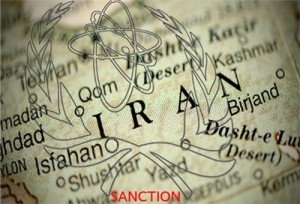 LONDON�The U.K. government is in talks with the U.S. and the European Union over a possible exemption to Iranian sanctions that would allow�BP�PLC to restart a North Sea natural gas field partially owned by a Tehran-controlled company.
LONDON�The U.K. government is in talks with the U.S. and the European Union over a possible exemption to Iranian sanctions that would allow�BP�PLC to restart a North Sea natural gas field partially owned by a Tehran-controlled company.The move comes as the U.S. and its allies have welcomed the elevation of a new Iranian president earlier this year as a possible opportunity to re-engage Iran in talks about its nuclear program. But the effort also comes amid increasing worry in the U.K. over Britain's natural gas supplies. Amid declining domestic gas output in Britain, prices have risen and the U.K. has boosted its imports.
BP's Rhum field, in the North Sea, is 50% owned by an affiliate of Iran's state oil company. BP closed it in 2010 amid tightening U.S. and EU sanctions aimed at stopping Iran's nuclear program. It is unclear exactly what shape the possible exemption might take, or whether a deal will be reached in the end. But recent efforts stem from newly adopted EU regulations, which allow exemptions under specific conditions.
"The BP gas field could be exempted from sanctions under an EU Council Regulation adopted in December 2012 amending previous regulation on restrictive measures against Iran," an EU spokeswoman said. The spokeswoman declined to comment on talks over the exemption.
"We are working with the EU to ensure the long-term security of the Rhum North Sea gas field and will be making an announcement on this in due course," said a spokeswoman for the U.K.'s Department of Energy and Climate Change. A spokeswoman for the U.S. State Department confirmed discussions had been held with the British government on the issue, but declined to provide details.
BP declined to comment on any talks about the field.
Rhum is 50% owned by IOC UK, which is controlled by the state-owned National Iranian Oil Co., via a Malaysia-based unit. It was producing around 5.4 million cubic meters of gas a day before it was shut down in 2010, according to BP. That is about 5% of current U.K. output.
The joint venture was set up in 1973 when Iran was still ruled by the Shah. Gas was discovered in the field in 1977, but because of the technically challenging nature of the reservoir, it only started producing in 2005. EU officials say it is the only Western-Iranian joint venture of its kind in the bloc.
U.K. and EU officials have previously won an effective exemption to U.S. sanctions for the $40 billion BP-led Shah Deniz natural gas project in the Caspian Sea off the coast of Azerbaijan. A unit of the National Iranian Oil Co. holds a 10% stake in that project.
By The Wall Street Journal
The Iran Project is not responsible for the content of quoted articles.










